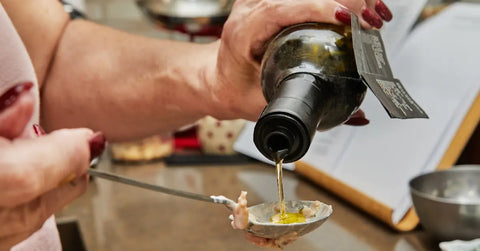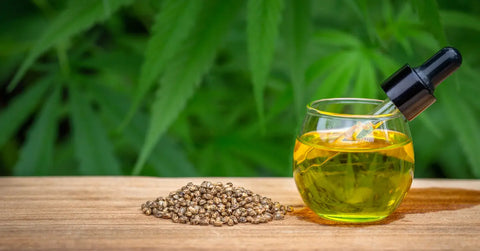
How To Use Hemp Seed Oil For Cooking?
Hold on! Cannabis sativa might raise some eyebrows, but let’s clear the air. Hemp, a variety of this plant, is specifically bred only for its fibres that wouldn’t make you high. The fibre is being extensively used for medicinal and industrial purposes; however, industrial applications aside, the real deal is the hemp seeds. Although these seeds are nutrient-dense, hemp seed oil can be easily incorporated into your cooking routine because it has an even healthier profile than olive oil. How? Let’s find out!
Table of Contents
How Is Hemp Used In Food?
Hemp’s jam-packed with protein, healthy fats and other nutrients, giving a powerful boost to your diet. But the question is: how can you incorporate more hemp into your diet? Unlike the industrial hemp used for fibres, hemp seeds and oils are the primary forms that people use for dietary purposes. Because they are a good source of protein and provide healthy fat, they can be used in various food products.
How Do You Prepare Hemp Seeds For Eating?
Hemp seeds are a nutritional powerhouse, boasting a wealth of protein, fibre, and healthy fatty acids. Adding them to your daily diet is a simple way to boost your overall health.
Preparing hemp seeds is very easy! You can:
- Toast them: Similar to other seeds, simply toss them in a pan over low-medium heat. No oil is needed, as hemp seeds are naturally rich in healthy oils. Toast until they start popping, then enjoy their delightful nutty flavour. Sprinkle them on yoghurt, salads, or even ice cream for a satisfying crunch.
- Grind them: For a more versatile option, grind the seeds in a food processor or blender. This hemp powder can be incorporated into batters for muffins, cakes, and cookies, adding a subtle nutty taste and a boost of fibre and healthy fats. Sprinkle it over cereal for an extra nutritional kick.
- Mix them into dressings: Hemp seeds can also be blended into dressings or pasta sauces, enhancing both the nutritional value and the flavour profile of your dish with a touch of nutty goodness.

Hemp Seed Oil Uses In Cooking
Hemp seed oil isn't just delicious; it's a nutritional powerhouse! Packed with essential fatty acids, protein, vitamins, minerals, and antioxidants, it can elevate your meals in more ways than one. Now that we know the benefits it offers, let’s know how to use hemp seed oil in cooking:
- Sautéing and Roasting: Hemp seed oil's high smoke point makes it perfect for sautéing vegetables, chicken, or meat. It also adds a nutty flavour, creating a delicious dressing for roasted veggies.
- Smoothie Booster: A drizzle of hemp seed oil adds a healthy dose of nutrients to your smoothie without overpowering the flavour, especially in fruit-based smoothies like banana, grape, or strawberry.
- Salad Saviour: Ditch the heavy dressings! Hemp seed oil provides a light, healthy alternative for your salads while adding a touch of richness that complements the fibre-rich greens.
- Desi Twist: Aur ghar ka khana? uska kya? Love home-cooked meals? Hemp seed oil can elevate your everyday dishes too! Try it for frying paranthas or add a touch to your chicken masala for a subtle nutty taste.
- Baking with Benefits: Hemp seed oil can be used in baking, but remember to use a small amount due to its lower heat tolerance. This ensures you retain the nutrients and still get perfectly baked cakes, cookies, or brownies.
By incorporating hemp seed oil into your cooking, you can add a touch of gourmet flavour while reaping its impressive health benefits.
Nutritional Breakdown of Hemp Seed Oil
Hemp seed oil is often called "Nature's most perfectly balanced oil" because it boasts an ideal 3:1 ratio of omega-6 to omega-3 fatty acids. This ratio is considered optimal for long-term human health. Rich in vitamin E and carotene (a precursor to vitamin A), hemp seed oil also helps fight free radicals and cell damage. Calcium, magnesium, sulphur, potassium, phosphorus, iron, and zinc also boast hemp seed oil's impressive nutrient profile.

Nutritional Benefits of Hemp Seed Oil
We've discussed hemp seeds and oil, but what exactly can they do for your health? Here's a breakdown of some key benefits:
- Heart Health Hero: Hemp seed oil is rich in gamma-linolenic acid (GLA), which helps reduce inflammation. This, in turn, lowers the risk of heart disease, a leading cause of death globally. GLA may even aid in heart recovery after a heart attack.
- Skin Soother: Packed with omega-3 and omega-6 fatty acids, hemp seed oil can improve your skin from the inside out. It helps combat dryness, redness, and itchiness while also improving blood flow to the skin. This can reduce the effects of eczema and other skin conditions.
- Aids Digestion: Fibre is essential for good digestion, and hemp seed oil is a great source. This fibre helps create beneficial gut bacteria and regulate cholesterol levels, keeping your digestive system running smoothly.
- Effective in Menopause: Studies show that fatty acids can significantly reduce PMS symptoms in women. The GLA in hemp seed oil is particularly effective, helping to regulate hormonal imbalances and ease symptoms of both PMS and menopause.
Overall, hemp seed oil is incredibly beneficial and healthy, with all these benefits backed up by science.
Conclusion
Both hemp seeds and oil aren't just a delicious addition to your meals; they're also packed with nutrients that can improve your overall well-being. Hemp seeds and oil offer a powerful combo: disease risk reduction and a healthy boost.The key is knowing how to incorporate them. With a little knowledge and the right amount, you can easily transform everyday dishes into tasty and nutritious creations.
Frequently Asked Questions
Q.1: How can hemp oil be used for cooking?
Hemp oil can be used in cooking in multiple ways. It can be used as a dressing for salads or also used in baking cookies, cakes and breads.
Q.2: Which is better: hemp oil or olive oil?
Both olive oil and hemp oil are beneficial in their own ways. However, olive oil has 40% more saturated fats than hemp oil. Also, hemp oil is a great substitute for reducing skin conditions’ symptoms and maintaining good gut health.
Q.3: Can hemp oil be used for frying?
Hemp oil is low in saturated fat and high in polyunsaturated fat, which are the most healthy types of fats. Due to their low smoke point, it’s not suitable for frying as it will get burnt.
Q.4: Can you stir fry with hemp oil?
Stir-frying isn’t possible with hemp oil, as it will get burnt. However, hemp oil can be used as a dressing room, sautéing vegetables and shallow frying.
Q.5: Are there any side effects of using hemp oil?
Consuming hemp seed oil is safe. However, it can cause minor digestive problems, but not in everyone.
Q.6: Are there any precautions to be taken while using hemp oil?
There are no precautions as such but don’t use hemp oil for frying and use it in recommended amounts around 2 tbsp.
